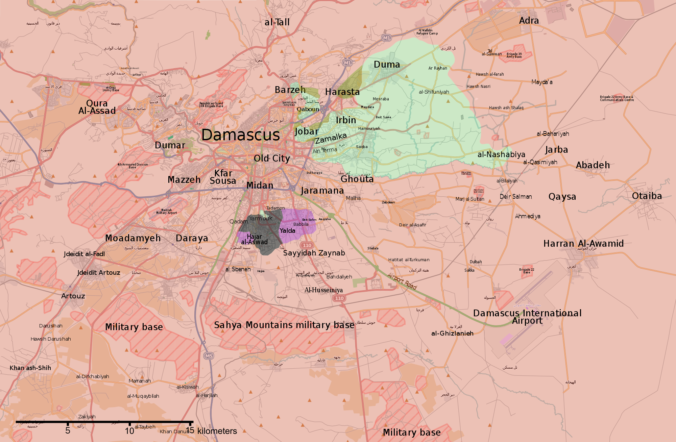Ghouta Attack
On August 21, 2013, the war in Syria reached a new low. Horrific pictures and stories began to spread about an attack near Damascus. Reports of chemical weapon use in the Ghouta region soon followed.
It was soon confirmed that there had indeed been a chemical attack. Deadly sarin-gas rockets had hit multiple areas within the Ghouta region, causing hundreds of casualties. But while there had clearly been an attack, its origins were less obvious. Syria, Russia, the US, UN, and opposition fighters all argued about who was responsible. These claims often reflected political interests more than truth-seeking. At Rootclaim, we set out to sift through the evidence in search of more objective conclusions.
Conventional Wisdoms
The EU, Arab League, US, and NGOs–an international consensus– blamed the Syrian government for the attacks. The US report stated “with high confidence“ that the Syrian government had carried out the attack in Ghouta. But how does such a statement hold up to an objective analysis of the relevant evidence?
Starting Point
Even before examining specific evidence, how likely is it that the Syrian Army, opposition fighters, or pro-government militias would carry out a chemical attack on a civilian target? There are few precedents for such an attack. Instead, we examined the plausible motivations and goals for each actor. The Syrian opposition would have been the most likely to benefit from a successful false-flag attack. On the other hand, the Syrian Army was seen as the least likely, because of the risk of political fallout and alienation.
Access to Chemical Weapons
A related question that the Ghouta analysis probed was whether opposition forces in Syria had access to sarin gas. Obviously in order to carry out the attack they would have needed access. However, under the other hypotheses, it is far less likely that opposition forces would have obtained sarin gas. But looking at the evidence (opposition members arrested trying to obtain sarin gas, videos of opposition fighters allegedly referencing or using sarin), Rootclaim’s analysis found it extremely likely that opposition forces in Syria had access to sarin. Thus, this pointed towards a greater likelihood of Syrian opposition forces carrying out the Ghouta attack.
Rocket Direction
Two rockets found in Zamalka after the attack shed more light on the attack. The rockets embedded in the ground, pointing south. This indicated that they had been shot from a location due north. Under the Syrian Army hypotheses, this was extremely unlikely, because they probably would have shot the rockets from one of their established locations, west or north-west of Zamalka.
Challenging Conventional Wisdom
After collecting and analyzing the evidence, Rootclaim’s algorithm concluded overwhelmingly that the opposition was the most likely culprit. This contradicts conventional wisdom in the Western media. However, it is based on objective analysis and comprehensive evaluation of the evidence. Moreover, Rootclaim’s methodology is transparent, and welcomes contributions, suggestions and critiques, making for a more reliable analysis. So, although the US government may have had “high confidence” in their assessment, Rootclaim’s analysis of the Ghouta attack reaches the exact opposite conclusion, finding the US claims to be highly unlikely.


April 11, 2017 at 1:04 pm
Comparing the Ghouta event with the recent one in Idlib province , we have to ask why there does not appear to be a comparable effort to obtain samples for analysis by the Fact Finding Mission of the OPCW. They collected blood and urine specimens from survivors at Ghouta ( ~ a week after the attack ) and many of these tested positive for sarin and/or decomposition products. They were thus quite valuable in confirming that sarin was involved.
In the more recent attack , instead we only have doctors in Turkey saying sarin was used. Not quite the same , IMO. Where’s the OPCW ? Were they granted access to these patients ?
http://abcnews.go.com/International/wireStory/chemical-attack-probe-aided-presence-victims-turkey-46631434
April 12, 2017 at 8:06 am
Thanks for the comment Marko. For now, this is what the OPCW has said: https://www.un.org/press/en/2017/sc12777.doc.htm It’s possible that the delay at accessing the area has to do with the fact that the surrounding area in Idlib is essentially controlled by Jabhat al-Nusra. We are also analyzing the current situation in Khan Sheikhoun (Idlib), and you can see that evolving analysis here: https://www.rootclaim.com/claims/what-caused-the-chemical-calamity-in-khan-sheikhoun-syria-on-april-4-2017-18448 Certainly if there is a relevant OPCW investigation, we will consider their findings, and incorporate them should they prove relevant.
April 19, 2017 at 3:08 pm
Is this site completely run or overrun by Russian trolls?
April 19, 2017 at 3:22 pm
At least the MH17 conclusion is sane.